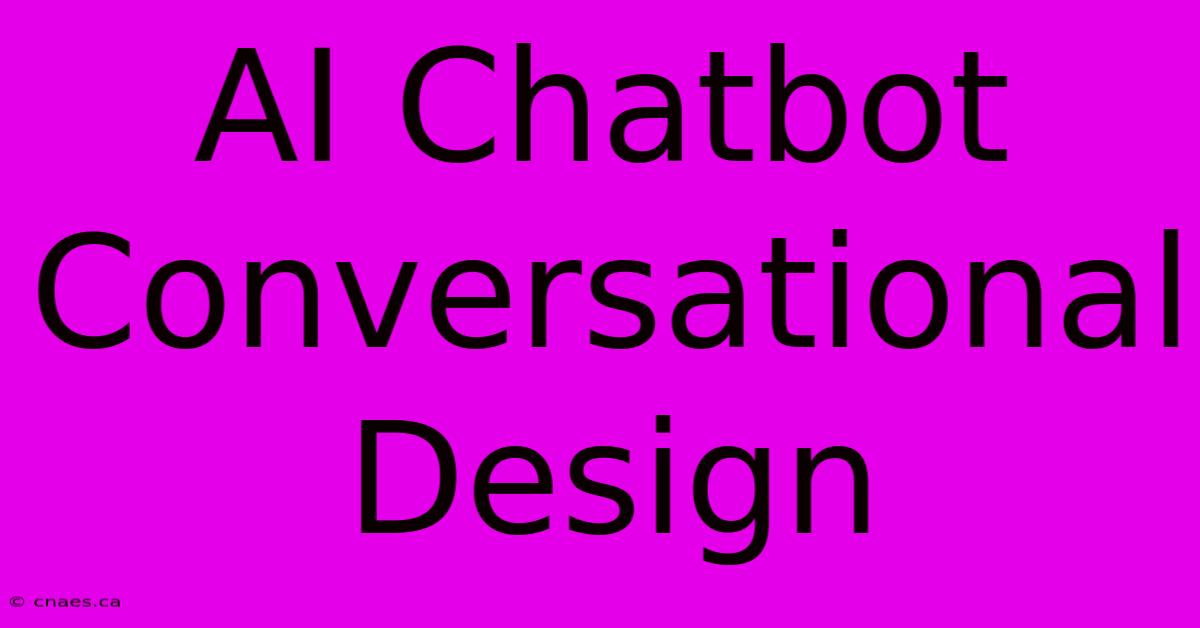AI Chatbot Conversational Design

Discover more detailed and exciting information on our website. Click the link below to start your adventure: Visit My Website. Don't miss out!
Table of Contents
AI Chatbot Conversational Design: Making Bots That Actually Talk to You (Like, For Real)
So, you wanna build a chatbot? Awesome! But let's be real, a clunky, unhelpful bot is worse than no bot at all. This is where conversational design comes in – it's the secret sauce that turns a digital dummy into a helpful pal. This ain't rocket science, but it does require some serious thought.
Understanding the User (aka, Your BFF)
Before you even think about coding, you need to understand your users. Who are they? What are their goals? What language do they use? Seriously, really think about this. Are they tech-savvy youngsters or grandma Betty trying to track her package? Their needs totally dictate the design.
For example, imagine designing a chatbot for a bank. Grandma Betty needs clear, simple language. A young investor might appreciate a more sophisticated, even slightly sassy, tone. Get this wrong, and your bot will become digital kryptonite. Avoid generic answers – personalize the experience.
The Art of the Flow: Mapping the Conversation
Think of this as creating a detailed roadmap for your conversation. You need to anticipate every possible user interaction. This usually involves flowcharts, which help you visualize how the conversation unfolds. Will it be linear? Branched? Will users need to navigate menus? This planning stage is crucial to avoid those annoying dead ends.
Example: Simple Booking Flow
Let's say you're building a chatbot for restaurant reservations. The flow might look something like this:
- Greeting: "Hi there! Ready to book a table?"
- Date & Time: "What date and time would you prefer?"
- Party Size: "How many people will be in your party?"
- Confirmation: "Let me just confirm... [Date], [Time], [Party Size]. Is that correct?"
- Success/Failure: "Great! Your reservation is confirmed!" or "Sorry, we're fully booked at that time. Would you like to try a different time?"
Writing for a Bot: It's Not Just Words
Writing for a chatbot is different than writing for humans. Keep it concise, clear, and conversational. Avoid jargon and overly complex sentences. Think short, punchy sentences. Imagine you're having a text conversation with a friend—that’s the vibe you should aim for. This makes interactions feel natural and less robotic.
Pro Tip: Test your copy on real people. Their feedback is gold!
Personality Matters: Giving Your Bot a Soul
This is where things get fun! Give your bot a distinct personality. Is it friendly and helpful? Professional and efficient? A little quirky? This will make interactions more engaging and memorable. Consistent personality is key. You don’t want a switch between serious and silly mid-conversation; that’s just awkward.
Beyond Words: Multimedia and Context
Don't limit yourself to just text! Use images, videos, and quick-replies where appropriate. Context is also incredibly important. Use previous interactions to tailor the response. If the user mentioned they're looking for Italian food earlier, the bot shouldn’t suggest Thai cuisine. Duh!
Measuring Success: Analytics are Your Best Friend
Don't just build your chatbot and forget it. Monitor its performance closely. Use analytics to track metrics such as conversation completion rates, user satisfaction, and popular paths taken. This data will help you identify areas for improvement and iterate your design.
The Bottom Line: Conversational Design is Key
Building a successful chatbot takes more than just code. It takes careful planning, insightful user research, and creative writing. By following these steps, you can create a chatbot that users will actually enjoy interacting with. And that, my friends, is the ultimate goal!

Thank you for visiting our website wich cover about AI Chatbot Conversational Design. We hope the information provided has been useful to you. Feel free to contact us if you have any questions or need further assistance. See you next time and dont miss to bookmark.
Also read the following articles
| Article Title | Date |
|---|---|
| Chelsea Dominates Heidenheim 2 0 | Nov 29, 2024 |
| What Shaboozey Didnt Show Thanksgiving | Nov 29, 2024 |
| Mary Sweeney Aontu Donegal Vote | Nov 29, 2024 |
| Hybe Stock Slumps After New Jeans Split | Nov 29, 2024 |
| Soyombos Arrest Nigerian Army Involved | Nov 29, 2024 |
